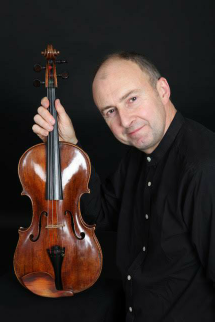Tickets are £15. Under 25s free.
Tickets may be purchased at the door or reserved in advance by either
‘phoning 01206 271128 or emailing a.j.arnold@outlook.com
All three works in our concert were composed around the same time.
We are delighted to welcome Martin Outram, our soloist in the Walton Viola Concerto.
Martin was born in Billericay. He attended King Edward VI Grammar School in Chelmsford, where Patricia Beckett taught him violin and viola, and then aged 15 sent him to have lessons with John White.
Martin is a member of the internationally renowned
Maggini Quartet. He has recorded over 50 discs with
the Quartet and other chamber music ensembles
and has been the recipient of the Gramophone Award,
the Diapason d’Or, a Cannes Classical Award, two
Grammy nominations and the Royal Philharmonic
Society Award for chamber music.
In addition to his work with the Maggini Quartet,
Martin appears widely as a soloist. His repertoire
embraces the major works for viola and several
works have been written for him. Since making his
Royal Festival Hall concerto debut with the London Mozart Players, Martin has appeared as a soloist in Russia, Argentina, Brazil and Europe. Recently highly acclaimed UK performances include the Bartok Concerto and the Mozart Sinfonia Concertante with Julian Leaper.
Walton’s Viola Concerto is one of the most famous and recognised compositions in the viola repertoire. It was first performed at the Proms in Queen’s Hall, London, in 1929. The viola concerto was well received. Walton was well known for revising his compositions after their first performance. In 1962 he reduced the orchestration and this revised version was then performed at the Royal Festival Hall with Sir Malcolm Sargent conducting and John Couling as the soloist. In 1972 the concerto was used for a ballet about Oscar Wilde.
Walton’s Portsmouth Point was inspired by Rowlandson’s print depicting Portsmouth Point. The bright and bawdy scene includes ‘lustful carousing amid mercantile ships, a tavern ….with a drunken peg-leg street fiddler narrowly avoiding treading on a mongrel hound’. The opening strands of the overture came to Walton whilst riding a route 22 bus in London. Listen out for the sailor’s hornpipe! Portsmouth Point was completed in 1928. Walton had left Oxford University without a degree having immersed himself in contemporary music. But within ten years of composing Portsmouth Point, and having composed the Viola Concerto, Belshazzar’s Feast and the First Symphony, Walton was regarded as the leading British composer of his generation.
Our concert concludes with Vaughan Williams’ Job – A Masque for Dancing. This one-act ballet, completed in 1931, was inspired by William Blake’s ‘Illustrations to the Book of Job’. The ballet has nine scenes, loosely based on Blake’s illustrations. The ‘story’ of the ballet is that Job has prospered and is seen by God to be a model servant. Satan claims that Job might not be such a good servant if he were to lose his fortune. God, however, being certain that Job would remain faithful, permits Satan to destroy Job’s fortune, his family and his health. Job remains faithful and God wins his bet with Satan. God restores Job and he lives to the age of 140.











